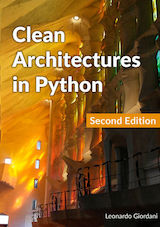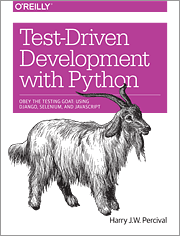
|
FreeComputerBooks.com
Links to Free Computer, Mathematics, Technical Books all over the World
|
|
- Title: Clean Architectures in Python: A Practical Approach to Better Software Design
- Author(s) Leonardo Giordani
- Publisher: The Digital Cat Books/Leanpub (2022)
- Paperback: N/A
- eBook: HTML and PDF
- Language: English
- ISBN-10/ASIN: N/A
- ISBN-13: N/A
- Share This:

|
The clean architecture is the opposite of spaghetti code, where everything is interlaced and there are no single elements that can be easily detached from the rest and replaced without the whole system collapsing. The main point of the clean architecture is to make clear "what is where and why", and this should be your first concern while you design and implement a software system, whatever architecture or development methodology you want to follow.
To fully appreciate the book you need to know Python and be familiar with Test-Driven Development (TDD), in particular with unit testing and mocks.
About the Authors- N/A
- Software Design and Patterns
- Python Programming
- Microservices and Service Oriented Architecture (SOA)
- Software Engineering Principles and Practices

- Clean Architectures in Python: A Practical Approach to Better Software Design (Leonardo Giordani)
- The Mirror Site (1) - PDF
- The Mirror Site (2) - PDF
- Book Homepage
-
 Clean Code in Python: Refactor Your Legacy Code Base
Clean Code in Python: Refactor Your Legacy Code Base
The book describes the basic elements of writing clean code and how it plays an important role in Python programming. You will learn about writing efficient and readable code using the Python standard library and best practices for software design.
-
 Architecture Patterns with Python (Harry Percival, et al.)
Architecture Patterns with Python (Harry Percival, et al.)
Enabling Test-Driven Development, Domain-Driven Design, and Event-Driven Microservices, it introduces proven architectural design patterns to help Python developers manage application complexity, and get the most value out of test suites.
-
 Beyond the Basic Stuff with Python: Writing Clean Code
Beyond the Basic Stuff with Python: Writing Clean Code
More than a mere collection of advanced syntax and masterful tips for writing clean code, advance your Python programming skills by using the command line and other professional tools like code formatters, type checkers, linters, and version control.
-
 O'Reilly® Test-Driven Development with Python (Harry Percival)
O'Reilly® Test-Driven Development with Python (Harry Percival)
By taking you through the development of a real web application from beginning to end, this hands-on guide demonstrates the practical advantages of test-driven development (TDD) with Python. You'll learn how to write and run tests BEFORE building your apps.
-
 Python for Everybody: Exploring Data in Python 3
Python for Everybody: Exploring Data in Python 3
This book is designed to introduce students to programming and software development through the lens of exploring data. You can think of the Python programming language as your tool to solve data problems that are beyond the capability of a spreadsheet.
-
 Automate the Boring Stuff with Python (Albert Sweigart)
Automate the Boring Stuff with Python (Albert Sweigart)
Learn how to use Python to write programs that do in minutes what would take you hours to do by hand - no prior programming experience required. You'll create Python programs that effortlessly perform useful and impressive feats of automation.
-
 Domain-Driven Design Quickly (Abel Avram, et al)
Domain-Driven Design Quickly (Abel Avram, et al)
This book is a short, quickly-readable summary and introduction to the fundamentals of Domain Driven Design (DDD), it does not introduce any new concepts; it attempts to concisely summarize the essence of what DDD is, drawing mostly the original book.
-
 Python Design Patterns (Brandon Rhodes)
Python Design Patterns (Brandon Rhodes)
Understand the structural, creational, and behavioral Python design patterns - this book will help you learn the core concepts of design patterns and the way they can be used to resolve software design problems using Python.
-
 Python 3 Patterns, Recipes and Idioms (Bruce Eckel, et al)
Python 3 Patterns, Recipes and Idioms (Bruce Eckel, et al)
This book is aimed at more experienced Python programmers who are looking to deepen their understanding of the language and modern programming idioms. It focuses on some of the more advanced techniques used by libraries, frameworks, and applications.
-
 Microservices vs Service-Oriented Architecture (SOA)
Microservices vs Service-Oriented Architecture (SOA)
This book walks you through a detailed comparison of microservices and SOA, by learning the core differences between the two with regard to architecture style and characteristics, service characteristics, and capability.





